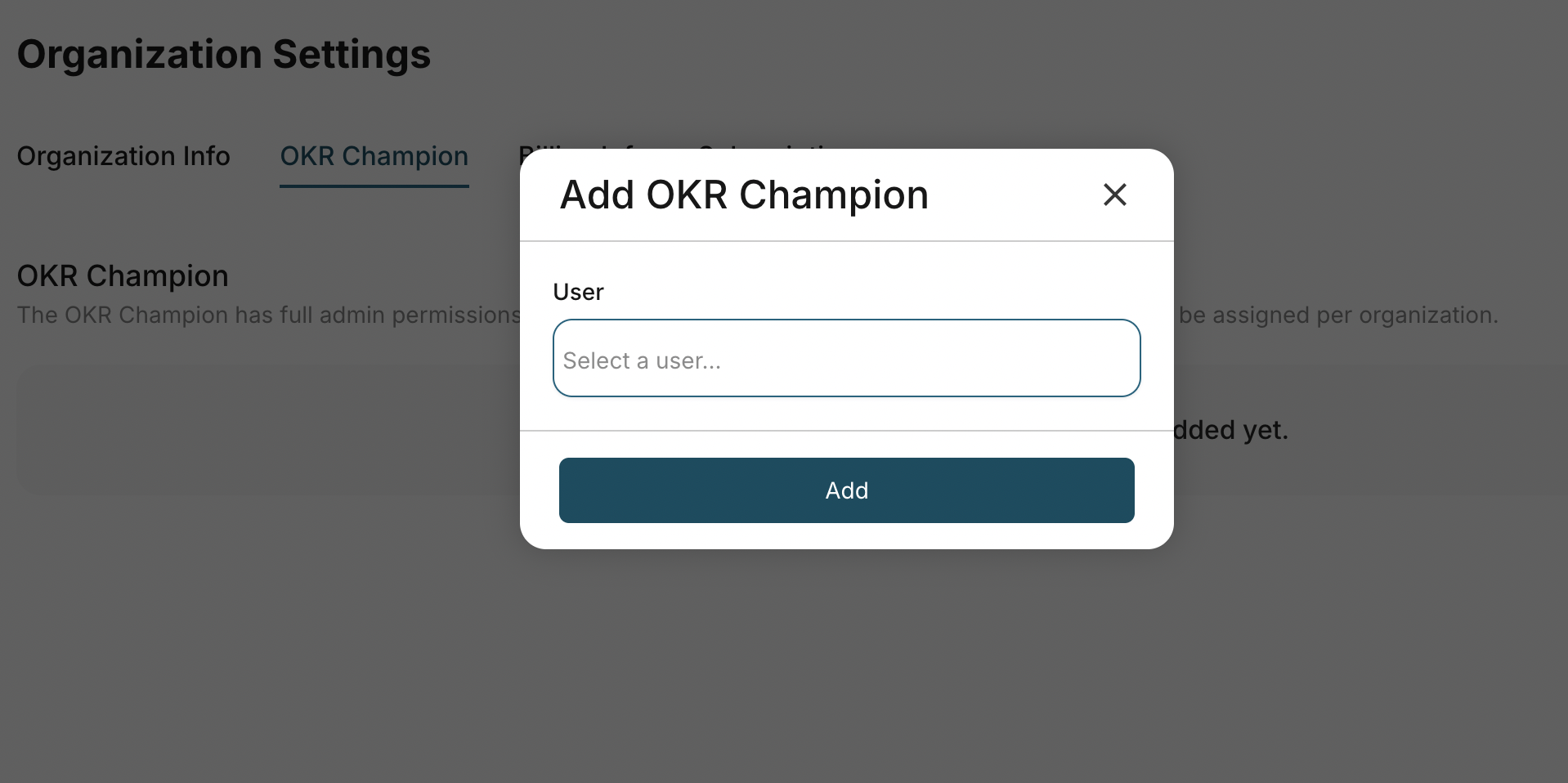You’ve set OKRs. But now check-ins are slipping, updates are missing, and no one’s quite sure what progress looks like. It’s not a goal problem - it’s a process one. You need an OKR Champion: someone to keep your team aligned, focused, and actually using the system you put in place.
______________________________________________________________________________________________________
So your team’s trying OKRs.
You’ve set some strong goals, maybe even shared them in a dashboard.
But a few weeks in, reality hits:
- Weekly check-ins aren’t happening.
- Teams forget to update key results.
- No one’s quite sure what counts as “done.”
That’s not a failure of the framework - it’s a sign you need an OKR Champion.
Whether you’re just getting started or trying to level up your goal-setting system, an OKR Champion can make the difference between a process that fades and one that sticks.
Especially in startups where speed is everything, you need someone to protect the rhythm, the focus, and the why behind your goals.
Let’s break down what an OKR Champion actually does, why the role matters more than you might think, and how to set someone up to succeed in it - without turning them into a glorified admin.
What Is an OKR Champion?
An OKR Champion is the person who owns the process behind your goals.
Not the business results - the workflow that keeps your team focused on those results.
They’re not “in charge” of everyone’s OKR goals, but they are the ones who make sure OKRs are visible, active, and part of how your company actually operates - not just how you plan.
Think of them as the quarterback of your goal-setting rhythm. They:
- Facilitate planning sessions
- Help teams align their OKRs to company priorities
- Keep check-ins running on time
- Catch drift early
- Support reflection and learning at the end of each cycle
They’re part coach, part project manager, and part alignment engine. In a startup, where everyone’s wearing multiple hats, the OKR Champion is the one making sure those hats are facing the same direction.
New: Assign Your OKR Champion Directly in OKRs Tool
Keeping OKRs alive isn’t just about setting goals - it’s about sustaining the rhythm. That’s why we’ve added a new feature: you can now assign an OKR Champion directly inside your organization settings.

With one click, your org admin can select a team member to serve as the OKR Champion - the person responsible for driving alignment, nudging progress, and making sure OKRs don’t fade into the background.
The OKR Champion has full admin permissions and acts as the central guide for your OKR process — without replacing team leads or owning results.
Assign your Champion today and keep your team focused, aligned, and finishing strong.
Why Startups Need an OKR Champion
In theory, OKRs are self-sustaining.
But in practice? They’re easy to ignore.
Startups, especially, operate in cycles of urgency. There’s always a launch, a fire, or a shift in focus. Without a clear owner, your OKRs become background noise. People default to “what’s loudest” instead of “what we said mattered.”
An OKR Champion protects your ability to focus.
They:
- Keep the company anchored to its top priorities - even when things get messy
- Catch when goals start slipping, or when work and key results drift apart
- Prevent the team from wasting hours updating OKRs once a quarter instead of working with them every week
- Build a feedback loop between planning, tracking, and reflection - so each cycle gets sharper
If your team has ever said “we set goals but don’t really use them,” you don’t need new goals. You need someone to own the process.
What Makes a Great OKR Champion?
You don’t need a dedicated strategy hire. What you need is someone who:
- Gets the value of OKRs
- Believes in focus over fluff
- Can guide people without micromanaging them
Here’s what to look for:
- Organized: They’re naturally systems-minded. They won’t let check-ins drift or reviews get skipped.
- Empathetic: They understand that not everyone is excited about structure - and they meet people where they are.
- Curious: They ask smart questions when OKRs are vague or misaligned. (“Is this really an outcome or just a task?”)
- Respected, but neutral: They can nudge across teams without needing positional authority.
- Cross-functional: They know what product is doing, what marketing is planning, and how those connect.
This isn’t about “owning goals” - it’s about owning the space between them. A great OKR Champion doesn’t make the work happen. They help everyone else make progress visible, shared, and intentional.
What Does an OKR Champion Actually Do?
Let’s break this down by cycle. Here’s what the OKR Champion is responsible for across a standard 6–12 week planning cycle:
During Planning
The Champion helps teams shape and align their goals - not by rewriting them, but by guiding the process. They:
- Schedule planning workshops and prep templates or tools
- Help teams connect their OKRs to company-wide objectives
- Review drafts and offer feedback on scope, measurability, and clarity
- Catch redundant goals, mismatched language, or missed priorities
- Align cross-functional OKRs and resolve conflicts early
Without a Champion, planning often drags - or gets stuck in vague, feel-good objectives that don’t hold up in execution. The Champion helps teams start strong, with goals they’ll want to track.
During the Cycle
This is where most OKR processes fall apart - and where the Champion keeps the wheels on.
They:
- Send regular nudges to update key results (weekly or biweekly)
- Track who’s updating and who’s falling behind
- Spot OKRs that are stalled, drifting, or unclear
- Surface blockers early - before a team spends three weeks on a project that’s no longer relevant
- Facilitate lightweight syncs where needed to realign teams
Think of this like “air traffic control” for your goals. The Champion doesn’t fly the planes. They keep the system safe, flowing, and responsive.
At the End of the Cycle
Without a proper review, your team risks repeating the same planning mistakes next quarter. The Champion ensures that doesn’t happen.
They:
- Run OKR retros or end-of-cycle reflections
- Document what was achieved (and what wasn’t), along with why
- Pull out patterns across teams or cycles
- Help leadership use OKR insights to adjust direction for the next cycle
- Share learnings with the team to strengthen future planning
This step creates continuity - and helps your goal-setting process become smarter over time. A strong OKR review turns execution into evolution.
What Your OKR Champion Should Own (At a Glance)
Before you assign the role, make sure it’s clear what the OKR Champion is actually responsible for - and what they’re not. This quick checklist outlines the core responsibilities of the role across each phase of the cycle:
This table helps set clear expectations - for the Champion and the rest of the team. It draws the line between facilitation and ownership, so the role empowers without bottlenecking.
Quick Tips for Empowering Your OKR Champion
Want your Champion to succeed? Don’t just assign the title. Set them up to lead.
Here’s how:
- Give them visibility. They need to see what each team is working on, who owns what, and how goals connect. That means access to the OKR software and a seat at the planning table.
- Give them real support. If the Champion flags a misalignment or drift, leadership should back them up. Otherwise, the process becomes optional - and ineffective.
- Use the right tools. Champions should never be stuck chasing updates in spreadsheets. A modern OKR platform makes check-ins, updates, and visibility automatic.
- Make the value clear. Help the team understand that the Champion isn’t there to control - they’re there to clarify, connect, and enable.
In other words: treat them like a multiplier, not a meeting owner. The better their setup, the better the system runs.
Final thoughts
OKRs are simple. Sticking with them? That’s the hard part.
Every startup reaches the moment where focus starts to fade. Priorities multiply. Teams get misaligned. And progress gets harder to track. That’s when a lightweight, consistent OKR process becomes your best asset.
But that system won’t run itself.
You need someone to carry the rhythm.
To connect the dots. To nudge the team back to what matters - week after week.
That’s the OKR Champion.
They don’t just make your goals visible.
They make them real.






